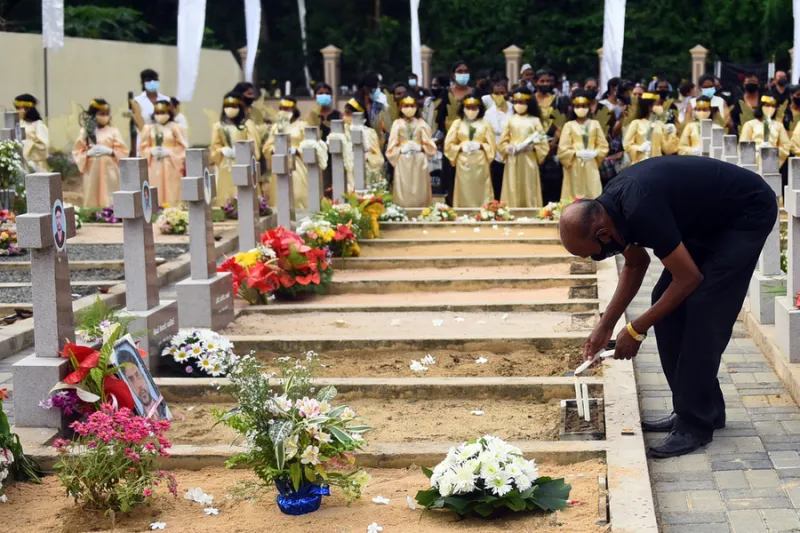
Denver Newsroom, Apr 28, 2021 / 14:00 pm (CNA).
Two years after bombings in Sri Lanka killed hundreds at several churches and hotels on Easter, police on Saturday arrested a former cabinet minister and his brother for alleged links to the bombings. Their attorney claimed the arrests were politically motivated.
Rishad Bathiudeen, who leads an opposition party in the Sri Lankan Parliament and formerly served in the cabinet, and his brother Reyaj were arrested in Colombo April 24 for allegedly “aiding and abetting the suicide bombers who committed the Easter Sunday carnage,” police spokesman Ajith Rohana said, according to the Associated Press. The brothers were not yet officially charged, but Rohana said there was direct evidence, circumstantial evidence, and “scientific” evidence for their involvement in the attacks.
“They were arrested after the scrutiny of bank accounts, check transactions and communication lines,” Rohana said, reported by the Indian newspaper The Hindu.
On April 21, 2019, nine suicide bombers targeted two Catholic churches, a Protestant church, four hotels, and a housing complex almost simultaneously. The church bombings occured in the middle of Easter Sunday services. The bombings killed more than 260 people and injured more than 500.
Two Sri Lankan groups who pledged allegiance to the Islamic State group have been blamed for the attacks.
Foreign intelligence warned the government ahead of the bombings, but a power struggle and a communication breakdown between the then-president and prime minister reportedly led to a failure to coordinate a security response.
Cardinal Malcolm Ranjith of Columbo has been an outspoken advocate for further investigations into the bombings. Some critics of the government’s investigation fear that corruption or negligence has prevented the prosecutions of collaborators.
On Saturday, Rishad Bathiudeen posted to Facebook that police were present outside his house since the early morning and were “attempting to arrest me without a charge.”
“They have already arrested my brother. I have been in Parliament, and have cooperated with all lawful authorities until now. This is unjust,” he said.
His attorney, Rushdie Habeeb, said the arrests were politically motivated. Habeeb said the arrests aimed to “punish the political leadership of the Muslims, which had nothing to do with (April 21), for the dastardly acts of some Muslim youths who were widely alleged as having been used as pawns by foreign powers.”
Bathiudeen served as the country’s Minister of Industry and Commerce, and now leads a minority Muslim party that is part of the main opposition political party. His brother Riyaj was arrested in May 2020 for his alleged contacts with suicide bombers, and was released on bail in October.
In September 2020 a police spokesman told journalists that Riyaj Bathiudeen had met with one of the suicide bombers before one of the attacks on a hotel, and that he had been accused of other acts of collaboration with the bombers. Several other suspects were arrested but were eventually released on the stated grounds of lack of evidence.
At that time, Cardinal Ranjith said security officials had confirmed to him that there was sufficient evidence against many of the bombing suspects who had been arrested. The cardinal, along with friends and family of the victims, expressed concern that the release of the suspects signaled corruption or a lack of a thorough investigation on the part of the Sri Lankan Criminal Investigation Department.
Rishad Bathiudeen was previously arrested in October for alleged misappropriation of state resources, and was released on bail in November.
Catholic and other religious leaders commemorated the second anniversary of the attacks on April 21, and prayed for an end to religious extremism.
Cardinal Ranjith joined Hindu, Buddhist, and Muslim leaders at the service, speaking at St. Anthony’s Shrine, the site of one of the major bombings. The service included prayers and two minutes of silence in remembrance of the dead.
Ranjith challenged the country’s Muslim communities to reject extremism and help Catholics identify those responsible for the attack. Muslim cleric Hassan Moulan said the Islamic faith does not justify crime, and said that Muslims around the world condemned the attack. The Sri Lanka Muslim community has not permitted the suicide bombers’ bodies to be buried in its cemeteries, to distance them from the religion of Islam.
Sri Lanka’s President Gotabaya Rajapaksa won election in 2019 while promising to find the truth of the attacks. His government previously accused a Muslim clergyman, who had been arrested after the attacks, of being the organizer.
Catholic leaders rejected this claim and suspected foreign involvement.
Ranjith has criticized a presidential commission that investigated the attacks, saying it focused on political leaders’ failure to prevent the attacks rather than on finding those directly responsible.
Sri Lanka is an island nation in the Indian Ocean, southwest of the Bay of Bengal. Its population numbers more than 21 million people. More than 70% of Sri Lankans are Buddhists, roughly 13% are Hindus, almost 10% are Muslims, and fewer than 8% are Christians. There are 1.5 million Catholics in the country, constituting the overwhelming majority of Sri Lanka’s Christians.
The country has been plagued with periodic violence since its 26-year civil war concluded in 2009.
If you value the news and views Catholic World Report provides, please consider donating to support our efforts. Your contribution will help us continue to make CWR available to all readers worldwide for free, without a subscription. Thank you for your generosity!
Click here for more information on donating to CWR. Click here to sign up for our newsletter.





Leave a Reply